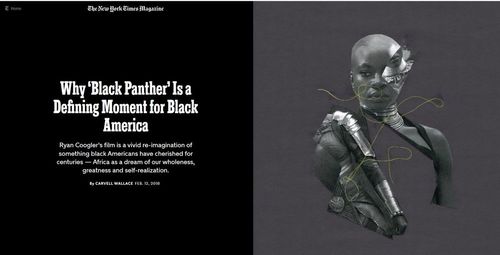From the New York Times Magazine:
Why ‘Black Panther’ Is a Defining Moment for Black America[Comment at Unz.com]Ryan Coogler’s film is a vivid re-imagination of something black Americans have cherished for centuries — Africa as a dream of our wholeness, greatness and self-realization.
By CARVELL WALLACE FEB. 12, 2018
… Wakanda’s rulers have wisely kept their homeland and its elemental riches hidden from the world, and in its isolation the nation has grown wildly powerful and technologically advanced. Its secret, of course, is inevitably discovered, and as the world’s evil powers plot to extract the resources of yet another African nation, T’Challa’s father is cruelly assassinated, forcing the end of Wakanda’s sequestration. The young king will be forced to don the virtually indestructible vibranium Black Panther suit and face a duplicitous world on behalf of his people. …
None of this is because “Black Panther” is the first major black superhero movie. Far from it. …
Around the time he was wrapping up “Creed,” Coogler made his first journey to the continent, visiting Kenya, South Africa and the Kingdom of Lesotho, a tiny nation in the center of the South African landmass. Tucked high amid rough mountains, Lesotho was spared much of the colonization of its neighbors, and Coogler based much of his concept of Wakanda on it. …
When I was a kid, I refused to eat watermelon in front of white people. …
“Black Panther” is a Hollywood movie, and Wakanda is a fictional nation. But coming when they do, from a director like Coogler, they must also function as a place for multiple generations of black Americans to store some of our most deeply held aspirations. We have for centuries sought to either find or create a promised land where we would be untroubled by the criminal horrors of our American existence. From Paul Cuffee’s attempts in 1811 to repatriate blacks to Sierra Leone and Marcus Garvey’s back-to-Africa Black Star shipping line to the Afrocentric movements of the ’60s and ’70s, black people have populated the Africa of our imagination with our most yearning attempts at self-realization. In my earliest memories, the Africa of my family was a warm fever dream, seen on the record covers I stared at alone, the sun setting over glowing, haloed Afros, the smell of incense and oils at the homes of my father’s friends — a beauty so pure as to make the world outside, one of car commercials and blond sitcom families, feel empty and perverse in comparison. …
… This is why it doesn’t matter that Wakanda was an idea from a comic book, created by two Jewish artists. No one knows colonization better than the colonized, and black folks wasted no time in recolonizing Wakanda. No genocide or takeover of land was required. Wakanda is ours now. We do with it as we please.
Until recently, most popular speculation on what the future would be like had been provided by white writers and futurists, like Isaac Asimov and Gene Roddenberry. Not coincidentally, these futures tended to carry the power dynamics of the present into perpetuity. Think of the original “Star Trek,” with its peaceful, international crew, still under the charge of a white man from Iowa. …
The artistic movement called Afrofuturism, a decidedly black creation, is meant to go far beyond the limitations of the white imagination. It isn’t just the idea that black people will exist in the future, will use technology and science, will travel deep into space. It is the idea that we will have won the future.
… At the heart of Wakanda, she suggests, lie some of our most excruciating existential questions: “What if they didn’t come?” she asked me. “And what if they didn’t take us? What would that have been?”…
Afrofuturism is like, ‘We already won.’ ” Comic books are uniquely suited to handling this proposition. …
Can films like these significantly change things for black people in America? …
Beyond the question of what the movie will bring to African-Americans sits what might be a more important question: What will black people bring to “Black Panther”? The film arrives as a corporate product, but we are using it for our own purposes, posting with unbridled ardor about what we’re going to wear to the opening night, announcing the depths of the squads we’ll be rolling with, declaring that Feb. 16, 2018, will be “the Blackest Day in History.”
… We hold one another as a family because we must be a family in order to survive. Our individual successes and failures belong, in a perfectly real sense, to all of us. That can be for good or ill. But when it is good, it is very good. It is sunlight and gold on vast African mountains, it is the shining splendor of the Wakandan warriors poised and ready to fight, it is a collective soul as timeless and indestructible as vibranium. And with this love we seek to make the future ours, by making the present ours. We seek to make a place where we belong.











